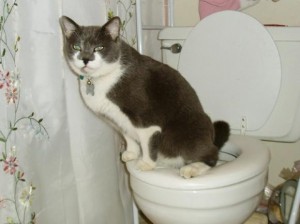Potential Issues of Flushing Cat Poop Down Your Toilet - Safeguard Your Plumbing
Potential Issues of Flushing Cat Poop Down Your Toilet - Safeguard Your Plumbing
Blog Article
What're your insights and beliefs about How to Dispose of Cat Poop and Litter Without Plastic Bags?

Intro
As feline owners, it's important to be mindful of exactly how we take care of our feline close friends' waste. While it may appear hassle-free to purge cat poop down the commode, this method can have detrimental repercussions for both the environment and human health.
Alternatives to Flushing
Thankfully, there are safer and extra accountable means to deal with feline poop. Consider the following alternatives:
1. Scoop and Dispose in Trash
One of the most common approach of dealing with pet cat poop is to scoop it into a biodegradable bag and toss it in the garbage. Be sure to utilize a specialized clutter scoop and deal with the waste quickly.
2. Use Biodegradable Litter
Opt for biodegradable cat clutter made from products such as corn or wheat. These trashes are environmentally friendly and can be safely gotten rid of in the garbage.
3. Hide in the Yard
If you have a backyard, consider burying cat waste in an assigned location far from vegetable yards and water resources. Be sure to dig deep sufficient to avoid contamination of groundwater.
4. Install a Pet Waste Disposal System
Invest in an animal waste disposal system specifically designed for pet cat waste. These systems make use of enzymes to break down the waste, minimizing odor and environmental influence.
Health and wellness Risks
In addition to ecological worries, flushing pet cat waste can likewise position wellness dangers to humans. Feline feces may have Toxoplasma gondii, a parasite that can create toxoplasmosis-- a potentially extreme illness, specifically for pregnant ladies and people with weakened body immune systems.
Ecological Impact
Flushing feline poop introduces dangerous virus and bloodsuckers right into the water supply, posing a significant risk to aquatic ecosystems. These contaminants can adversely influence aquatic life and compromise water quality.
Conclusion
Liable pet dog possession extends past giving food and shelter-- it also entails appropriate waste administration. By avoiding purging cat poop down the commode and selecting alternative disposal approaches, we can reduce our ecological footprint and shield human health and wellness.
Why You Should Never Flush Cat Poop Down the Toilet
A rose by any other name might smell as sweet, but not all poop is created equal. Toilets, and our sewage systems, are designed for human excrement, not animal waste. It might seem like it couldn’t hurt to toss cat feces into the loo, but it’s not a good idea to flush cat poop in the toilet.
First and foremost, assuming your cat uses a litter box, any waste is going to have litter on it. And even the smallest amount of litter can wreak havoc on plumbing.
Over time, small amounts build up, filling up your septic system. Most litter sold today is clumping; it is made from a type of clay that hardens when it gets wet. Ever tried to scrape old clumps from the bottom of a litter box? You know just how cement-hard it can get!
Now imagine just a small clump of that stuck in your pipes. A simple de-clogger like Drano isn’t going to cut it. And that means it’s going to cost you big time to fix it.
Parasitic Contamination
Believe it or not, your healthy kitty may be harboring a nasty parasite. Only cats excrete Toxoplasma in their feces. Yet it rarely causes serious health issues in the cats that are infected. Most people will be fine too if infected. Only pregnant women and people with compromised immune systems are at risk. (If you’ve ever heard how women who are expecting are excused from litter cleaning duty, Toxoplasma is why.)
But other animals may have a problem if infected with the parasite. And human water treatment systems aren’t designed to handle it. As a result, the systems don’t remove the parasite before discharging wastewater into local waterways. Fish, shellfish, and other marine life — otters in particular — are susceptible to toxoplasma. If exposed, most will end up with brain damage and many will die.
Depending on the species of fish, they may end up on someone’s fish hook and, ultimately on someone’s dinner plate. If that someone has a chronic illness, they’re at risk.
Skip the Toilet Training
We know there are folks out there who like to toilet train their cats. And we give them props, it takes a lot of work. But thanks to the toxoplasma, it’s not a good idea.

I was made aware of that editorial on Can You Flush Cat Poo or Litter Down the Toilet? from someone on our other blog. Sharing is good. One never knows, you may very well be doing someone a favor. Thanks a lot for going through it.
Schedule Service Report this page